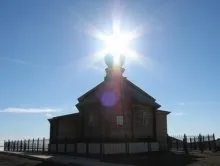
However this was not a “happy ending”, but only the beginning of a difficult struggle to survive as a unique northern people with its own history, culture and traditions. The reality is that the newly recognized Dolgan national language is on the edge of extinction. Like the majority of other peoples of the Far North the Dolgans had had reindeer herding as their traditional livelihood for centuries. But after the revolution the reindeer herders’ freedom to roam came to an end. Collectives and settlements were set up and Dolgan children were sent to boarding schools where they were taught only in Russian. This resulted in a gradual dying out of the spoken language. As for a script, this language had never had one. About 30 years ago, in the last years of the Soviet ‘empire’ a Dolgan alphabet was worked out and the first written texts in Dolgan appeared. Now the language is being taught at schools, and there is a chance for its revival. There is a great need for Dolgan texts.

Furthermore, among other peoples of the North the Dolgans are specially known for their gentle ways and warm hospitality. What they lack is the message of Christ in their own language so that it could be heard and received and cherished. But there was time in the 18th century when the Dolgans were Christians, having acquired faith through missionaries of the Orthodox church. Before the revolution every big Dolgan village had a church in it. After 1917 all of them were destroyed… But never, either in post-Soviet Russia or even in those pre-revolutionary days did the Dolgans have the Bible in their mother tongue.

When asked if all the necessary terms and biblical names have been preserved in the language from pre-revolutionary times, she comments,
“Ah, when very old people are praying, they are using these special words, and they even call the apostles by the Dolgan names! But nobody among the young people knows either these words or these biblical names. Why, how could we learn them if there were no written texts?.. You know, this is our national peculiarity that the Dolgans are never praying aloud. Our elderly people are all praying silently. That is why we have just never had a chance to hear! I can draw a simple parallel. When a Russian family is gathered together to have a dinner, if they are a family of Christian believers, they are reading their dinner prayers aloud at table, while the Dolgans in the same situation are praying silently; everyone is praying deeply within himself. However once I did have an exciting experience. From the middle of the 1990s to the beginning of the 2000s I was working on the radio. And once we had a guest on our program, with whom we were discussing on the air how life is hard, and how our nation is dying out, and the language is in danger of extinction, and traditions are irretrievably lost and the reindeer herding is no more, and so on and so forth… With the inevitable conclusion, ‘Everything is getting worse and worse’. And at the very end of our talk he exclaimed in Dolgan, ‘Oh Lord, help my people to acquire Your Word!’ I was shocked. It meant that there are such words in our language, he had found them, he had taken them from somewhere, he had formulated this short prayer so naturally!..”
The book “Jesus Friend of Children” in Dolgan was first published by IBT in 1997 and it has now been revised in order to be published as a Dolgan/Russian diglot which will be a great help to children in their study of the native language.

Very soon this autumn a missionary trip of Evangelical Christians is planned to the furthest settlements of Taimyr. Missionaries always take IBT publications with them in order to distribute them among the local population of the Far North. This time it is going to be a very complicated project. The missionaries will have to take a flight to a certain settlement, make a camp there and then divide into 3 teams and fly to the three most distant villages by helicopter. The total distance between the settlements is about 1,000 km each, which means that they should all be visited during one expedition. It is impossible to visit them one by one, because it is too expensive and too far. The majority of the population in these settlements is Dolgan, and they are waiting eagerly for the new editions in their mother-tongue!
IBT Russia/CIS is a non-profit organization financed through contributions from individuals, sponsoring organizations and foundations.
You can donate to IBT:
Through: AO UniCredit Bank, Moscow
SWIFT: IMBKRUMM
In favour of: Institute for Bible Translation
Address: 119334, Russia, Moscow, Andreevskaya nab. 2
TIN (INN) 7736231521
9-digit Bank identification code in Russian banking system: 044525545
Account no. (IBAN):
634261 USD 4020 02 001 or 40703840700010142881
634261 EUR 4020 02 001 or 40703978700010366720
634261 GBP 4020 02 001 or 40703826600010366723
Through: NOSTRO ACCOUNTS OF AO UNICREDIT BANK, MOSCOW:
USD JPMORGAN CHASE BANK N.A., NEW YORK SWIFT CODE: CHASUS33
EUR UNICREDIT BANK AG (HYPOVEREINSBANK) , MUNICH SWIFT CODE: HYVEDEMM
EUR UNICREDIT BANK AUSTRIA AG, VIENNA SWIFT CODE: BKAUATWW
EUR UNICREDIT S.P.A., MILANO SWIFT CODE: UNCRITMM
GBP THE ROYAL BANK OF SCOTLAND PLC, LONDON SWIFT CODE: RBOSGB2L
Important! In the field "designation" write "CHARITY DONATION"
For more information address IBT
You may sign up to receive our Russia/CIS monthly English newsletter here
